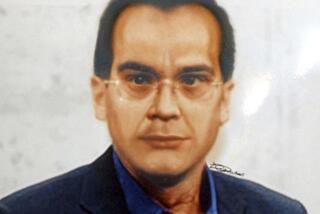ORGANIZED CRIME : Criminal Fish Fall Into Police Net in Italy
- Share via
ROME — One had just stepped off a plane in France. One was getting into a car in northern Italy. One was huddled in a secret cellar of a villa in southern Italy.
The three were all key bosses of organized crime, all fugitives, all on Italy’s most-wanted list. And they all have been arrested in the past 10 days.
“Finally, the fish are coming into the net,” said Interior (Police) Minister Nicola Mancino. “We have gone from the defensive to the offensive to show that the state exists and that it can act.”
Nobody is proclaiming victory in the prolonged struggle against many-tentacled mobs who this summer killed two senior magistrates in Palermo and a police chief in Catania. Still, the police at last are scoring points. In 139 days through Thursday, they arrested 42 organized crime figures, including bosses of gangs from Sicily, Naples and Calabria.
Three of the biggest fish flopped into an Italian jail courtesy of Venezuela. After long scrutiny, that country extradited Pasquale Cuntrera and his brothers, Gaspare and Paolo, long sought by Italian authorities as chiefs of a huge international narcotic empire. One investigator called their extradition Italy’s biggest victory against the Mafia in 50 years.
Return of the Cuntrera brothers had been requested by the chief Mafia fighter, Magistrate Giovanni Falcone, who was blown up with his wife and three bodyguards on the road to Palermo in May. In July, Magistrate Paolo Borsellino, who was to have been Falcone’s successor, died with five bodyguards in a car bomb outside his mother’s house in the Sicilian capital.
The Italian government sent 7,000 troops to Sicily after Borsellino’s murder to bolster local police; FBI experts were dispatched from Washington as a gesture of American good will.
The government also created specially trained anti-Mafia police investigative units. Parliament legalized use of U.S.-style law-enforcement techniques.
Perhaps the most dramatic breakthrough is the far greater public support now for police, even in areas where organized crime is endemic. There is less honor among the bad guys. The vaunted code of silence, or omerta, is almost as outmoded as the smuggler’s mule.
Captured Mafiosi now talk with some regularity, although it is not always a safe thing to do: Two brothers were murdered in Catania earlier this year soon after their cousin gave police evidence on one of Italy’s most wanted Mafia chieftains.
Tellingly, the new police successes have come against all three major components of organized crime in Italy: the Cosa Nostra in Sicily, the ‘ndrangheta in Calabria and the Camorra in Naples. The three are first cousins, and they have all lost top bosses to the new offensive.
First to fall was Giuseppe Madonia, thought to be No. 2 in the Cosa Nostra and a suspect in the murder of the two magistrates. Madonia, 45, who had been on the run for nine years, was captured as he entered his car near Vicenza. Investigators called him one of a handful of members of a worldwide Cosa Nostra summit.
A few days later, the reputed No. 1 of the Camorra was arrested after eluding police for a decade. Carmine Alfieri, 40, was found in an underground concrete bunker at a villa in Naples. On Wednesday, it was the turn of the Calabrian ‘ndrangheta. Domenico Libri, 58, who lived under an assumed name in France for three years, was arrested by French and Italian detectives as he debarked from a Paris-to-Marseilles flight. Like Madonia and Alfieri, Libri was a prominent, longstanding member of Italy’s 20 most-wanted.
Police hope that success will breed success as their nets spread wider and international cooperation grows. There are certainly fish enough to be caught in the sea of Italian organized crime: Police have warrants for 11,800 suspects.
More to Read
Sign up for Essential California
The most important California stories and recommendations in your inbox every morning.
You may occasionally receive promotional content from the Los Angeles Times.













